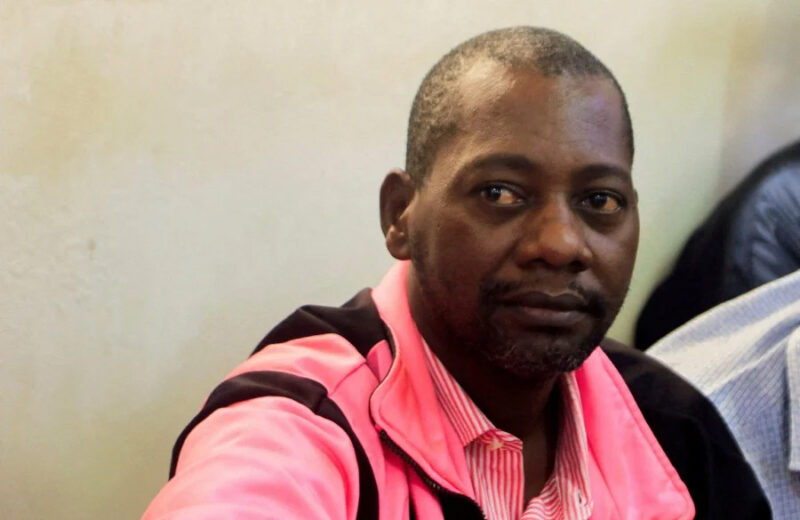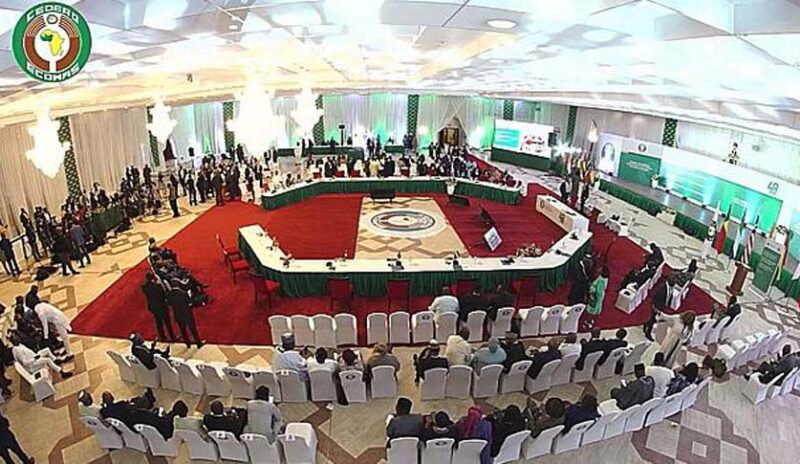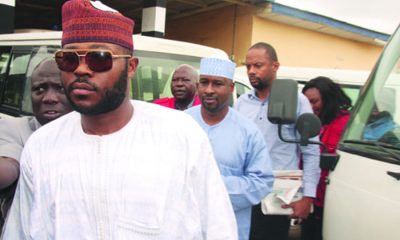Africa
Autopsies reveal missing organs in Kenya church deaths

Autopsies reveal missing organs in Kenya church deaths
Autopsies on corpses found in mass graves linked to a church in Kenya have revealed missing organs and raised suspicions of forced harvesting, investigators said, with a fresh round of exhumations set to resume Tuesday.
The discovery of mass graves last month near the Indian Ocean coastal town of Malindi has stunned the deeply religious Christian-majority country in what has been dubbed the “Shakahola forest massacre”.
Police believe most of the bodies belong to followers of self-styled pastor Paul Nthenge Mackenzie who is accused of ordering them to starve to death “to meet Jesus.”
While starvation appears to be the main cause of death, some of the victims — including children — were strangled, beaten, or suffocated, according to the chief government pathologist Johansen Oduor
Court documents filed on Monday said that some of the corpses had their organs removed, with police alleging that the suspects were engaged in forced harvesting of body parts.
“Post mortem reports have established missing organs in some of the bodies of victims who have been exhumed,” chief inspector Martin Munene said in an affidavit filed to a Nairobi court.
READ ALSO:
-
JUST IN: NECO reschedules entrance examination to school for gifted children
-
BREAKING: Again, presidential election tribunal shifts pre-hearing of Atiku’s petition against Tinubu
-
Salary Increase: UNILORIN SSANU urges members to be calm over exclusion
It is “believed that trade on human body organs has been well coordinated involving several players,” he said, giving no details about the suspected trafficking.
Munene said that Ezekiel Odero, a high-profile televangelist who was arrested last month in connection with the same case and granted bail on Thursday, had received “huge cash transactions,” allegedly from Mackenzie’s followers who sold their property at the cult leader’s bidding.
The Nairobi court ordered the authorities to freeze more than 20 bank accounts belonging to Odero for 30 days.
A total of 112 people have so far been confirmed dead, interior minister Kithure Kindiki said Tuesday after arriving in Malindi to supervise the resumption of exhumations, which were suspended last week because of bad weather.
“Search and rescue efforts for persons suspected to be holed up in the thickets and bushes have been going on,” Kindiki said.
Questions have been raised about how Mackenzie managed to evade law enforcement despite a history of extremism and previous legal cases.
The former taxi driver turned himself in on April 14 after police acting on a tip-off first entered Shakahola forest, where some 30 mass graves have now been found.
Prosecutors are asking to hold the father of seven, who founded the Good News International Church in 2003, for another 90 days until investigations are completed.
Senior principal magistrate Yusuf Shikanda said he would rule on the request on Wednesday.
Autopsies reveal missing organs in Kenya church deaths
(vanguard)
Africa
Niger coup leader sworn in as president for five years

Niger coup leader sworn in as president for five years
Niger’s military ruler Gen Abdourahamane Tchiani has been sworn in as the country’s president for a transitional period of five years.
Tchiani has led the country since 2023, after he deposed Niger’s elected president, Mohamed Bazoum.
On Wednesday, Tchiani took the presidential office under a new charter that replaces the West African country’s constitution.
He was also promoted to the highest military rank of army general in the country and signed a decree ordering that all political parties be dissolved.
During the ceremony in Niamey, Tchiani said of his new military rank, “I receive this distinction with great humility… I will strive to live up to the trust placed in me.”
The transition to democratic government is consistent with the recommendations of a commission formed following national deliberations.
The new charter states that this five-year timeframe is “flexible” based on the country’s security position.
READ ALSO:
- AI will replace doctors, teachers, others in 10 years – Bill Gates
- Senate seeks FG’s immediate intervention to slash data prices
- Reno Omokri: Nigeria gives more opportunities than US, Britain, Canada
Niger has been plagued by Islamist attacks for years, which was one of the reasons junta officials staged their coup.
The military takeover came after a number of others in the region; adjacent Mali, Guinea, and Burkina Faso are also ruled by dictatorships.
All four countries have split ties with erstwhile colonial power France, forming new alliances with Russia.
And all save Guinea have pulled out of ECOWAS, the West African regional group.
Niger’s relations with ECOWAS broke down when the junta demanded a three-year transition period to democratic governance directly after the coup.
Ecowas labelled this plot a “provocation” and vowed to interfere with force before eventually backing down.
Gen Tchiani’s regime is prosecuting former President Bazoum on charges of high treason and damaging national security.
Bazoum and his wife remain in the presidential palace, despite the fact that his son was granted provisional freedom in January.
According to state-run news agency ANP, Gen Tchiani stated that Niger’s new charter adheres to traditional constitutions while also implementing “unprecedented measures to protect our natural resources so that Nigeriens truly benefit from the exploitation of their wealth.”
Niger coup leader sworn in as president for five years
Africa
Fuel hits N8,000/litre in Niger, country seeks help from Nigeria

Fuel hits N8,000/litre in Niger, country seeks help from Nigeria
With the fuel crisis bedevilling the Republic of Niger, some of its military officials have visited Abuja to seek support from Nigeria to tackle the shortage of Premium Motor Spirit in the country.
It was gathered that the delegation successfully got the approval for 300 trucks of fuel from the Nigerian government.
Trouble started for Niger -which has been reliant on a Chinese refinery – after the refinery was shut down due to some misunderstanding with the supplier.
This led to Niger turning to Nigeria for help to ameliorate the fuel shortage experienced by the country.
READ ALSO:
- Kano govt clarifies appeal court ruling on Sanusi’s reinstatement as emir
- NAF strikes kill notorious bandit kingpins, 20 others in Zamfara
- Chelsea beat Man City to win Women’s League Cup
Officials from the Nigerian government noted that the deal was approved with the hope of using it as a bargaining tool with Niger.
“We do not want to blow our trumpet. Rather, we want to use it as a bargaining chip for negotiation, as we continue to engage with them to bring them back to ECOWAS.
“Let them get more from us. I am confident that gradually they will come back to ECOWAS because they do not have enough resources to import food to sustain their citizens,” the official said while pleading anonymity.
Sources stated that fuel prices in Niger were hitting N8,000 per litre
However, some transborder businessmen have attributed the fuel scarcity in Niger to the lingering relationship between the country and Nigeria.
They noted that in some cross-border towns to Niger, fuel is being sold for between 1,200 CFA and N3,500 (N2,500 and N8,500).
Fuel hits N8,000/litre in Niger, country seeks help from Nigeria
Africa
ECOWAS activates standby force against insurgency

ECOWAS activates standby force against insurgency
The Economic Community of West African States (ECOWAS) has activated its Standby Force to curb terrorism and other transborder crimes in the subregion.
The Minister of Defence, Mohammed Badaru, who disclosed this in Abuja on Tuesday at the Forty-third ordinary meeting of ECOWAS Committee Chiefs of Defence Staff said the economic growth of the region is dependent on stable peace.
The minister added that there is a need for members of ECOWAS to close ranks against all forms of threats against the region.
On January 29, 2025, ECOWAS recognised the exit of three of its former members Burkina Faso, Mali, and Niger Republic upon the expiration of a one-year notice period.
READ ALSO:
- Supreme court dismisses appeal against Aiyedatiwa’s candidacy
- US set to present 30-day ceasefire offer to Russia
- BREAKING: House of Reps orders shutdown of porn websites nationwide
However, in “the spirit of regional solidarity”, ECOWAS asked its member countries to still recognise the national passports of the three exiting countries bearing the ECOWAS logo until further notice.
Their departure from the bloc has fractured the region and is leaving the ECOWAS grouping with an uncertain future.
The three junta-led countries formally notified ECOWAS of their plan for an “immediate” withdrawal in January 2024, citing the organisation’s excessive dependence on France in particular.
Paris has become the common enemy of the three juntas, which now favour partnerships with countries such as Russia, Turkey and Iran.
However, ECOWAS required one year’s notice for the departure to be effective — that deadline falls on January 29, 2025.
The three Sahelian countries have teamed up to form a separate confederation called the Alliance of Sahel States (AES).
ECOWAS activates standby force against insurgency
-

 metro2 days ago
metro2 days agoRivers administrator Ibas fires Fubara’s political appointees
-

 metro2 days ago
metro2 days agoJUST-IN: Ex-Oyo gov Ajimobi’s first child Bisola dies At 42
-

 metro2 days ago
metro2 days agoFG declares public holidays for Eid-el-Fitr
-

 metro3 days ago
metro3 days agoHow ritualists, native doctor drugged, murdered underage sisters in PH – Police
-

 metro1 day ago
metro1 day agoEFCC re-arraigns son of ex-PDP chairman for alleged N2.2bn oil subsidy fraud
-

 Africa2 days ago
Africa2 days agoNiger coup leader sworn in as president for five years
-

 metro2 days ago
metro2 days agoNatasha: Murray-Bruce slams Atiku, defends Akpabio
-

 International2 days ago
International2 days agoAI will replace doctors, teachers, others in 10 years – Bill Gates

